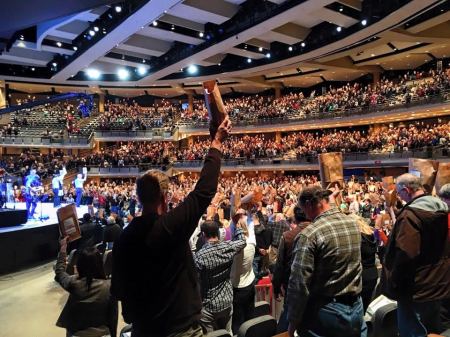Fastest-Growing Churches Teach Literal Interpretation of the Bible, Study Finds

A Canadian study of Mainline Protestant churches has found that ministries that promote conservative teachings and a literal interpretation of the Bible are more successful in growing their membership than liberal churches.
"If we are talking solely about what belief system is more likely to lead to numerical growth among Protestant churches, the evidence suggests conservative Protestant theology is the clear winner," said David Haskell, the lead researcher of the study, titled "Theology Matters: Comparing the Traits of Growing and Declining Mainline Protestant Church Attendees and Clergy."
The Guardian reports that the study analyzed 2,225 churchgoers in Ontario, Canada, and held interviews with 29 clergy and 195 congregants, comparing the beliefs of those attending Mainline Protestant churches with growing attendances to those with declining numbers.
Haskell affirmed that the growing churches "held more firmly to the traditional beliefs of Christianity and were more diligent in things like prayer and Bible reading."
Haskell added that he expects the study, due to be published in December in the Review of Religious Research journal, to be controversial.
"If you're in a Mainline church and that church is dying, and you've just heard that the theological position that you have is likely what's killing it, you're not going to be very happy about that," the researcher said. "Theological orientation cuts to the very core of the religious practitioner."
The paper offered several statistics, and showed that only half of clergy from declining churches agreed it was "very important to encourage non-Christians to become Christians," compared to 100 percent of clergy from growing churches.
What is more, 71 percent of clergy from growing churches read the Bible daily, compared to 19 percent from declining churches; while 100 percent of clergy from growing churches agreed that "God performs miracles in answer to prayers," though only 44 of declining-churches clergy said the same.
Various studies have been conducted on the subject of church growth, and there have been previous ones, such as the 2014 General Society Survey, which also suggested that more American churchgoers identify as conservative rather than liberal when it comes to theology.
Barna research also showed that 67 percent of millennials wanted a "classic" service rather than a "trendy" one, and 77 percent want it to take place in a sanctuary instead of an auditorium.
Jeff Walton of the Institute of Religion & Democracy told The Christian Post in a 2015 interview that, "Traditional teachings and Orthodox theology do not in and of themselves guarantee church growth, but they do appear to be a necessary component of church growth. Social scientists have observed for some time now that organizations that require more of their members tend to grow and do better than those organizations that ask little from their members."
"Churches offering a strong critique of the prevailing culture are at stark contrast with the world around them," he added. "People flock to these congregations because they offer something that cannot be found elsewhere — in this case, a message of repentance, transformation and new life."





















